Year in Review 2022



As 2022 comes to a close, I am pleased to share UC Davis School of Medicine’s many successes and milestones. This year, U.S. News & World Report ranked us as the third most diverse medical school in the country, with top 10 rankings in primary care and family medicine.
UC Davis recently achieved a historic milestone in its research mission, with $1.07 billion in external funding in fiscal year 2021–22. We are now part of a distinctive group of fewer than 20 public universities in the nation to surpass $1 billion in research funding.
The School of Medicine was central to this accomplishment, bringing in a record-high $396 million — nearly 40 percent of the UC Davis total. This achievement is a testament to our groundbreaking faculty scientists and transdisciplinary research teams that are transforming lives with their discoveries and helping us deliver tomorrow’s health care today.
This year, the Liaison Committee on Medical Education (LCME) awarded our medical school a full eight-year reaccreditation at the highest level of accreditation possible. Our success attests to years of meticulous preparations and extraordinary work by Vice Dean for Education Dr. Mark Servis, the Office of Medical Education, and leaders from across the school and UC Davis Health. It affirms our school’s commitment to excellence, continuous quality improvement, and listening to and addressing our students’ concerns and needs.
We’ve also launched a new collaborative pre-med pathway program for community college students, Avenue M, to address the shortage of primary care physicians in California’s rural, medically underserved areas. This is one of seven of our innovative pathway programs to help diversify California’s physician workforce to better reflect the state’s population and thus advance health equity and improve the health of diverse communities statewide.
This summer, we welcomed 133 talented and diverse incoming first-year medical students. Half of our Class of 2026 identifies with groups that are underrepresented in medicine. Women make up 60 percent of the class. Our new students are an inspiring addition to our mission-driven School of Medicine community.
Thanks to support from our generous donors, the School of Medicine has raised $366.1 million — 86 percent of its $426.5 million goal, with two years remaining in the Expect Greater campaign which publicly launched in October 2020.
As one of the many support programs we offer our students, this year I initiated the Dean’s Student Assistance Fund to help meet our medical students’ emergency and unforeseen needs. Thank you to the many donors who have joined me in supporting this and many other programs benefiting our students.
We are also implementing our new five-year strategic plan in alignment with the UC Davis Health NEXT Clinical Strategic Plan and the Betty Irene Moore School of Nursing plan. Developed with the input of more than 200 School of Medicine constituents, our plan is a comprehensive framework to advance our education, clinical care, research, and community partnership missions.
As you will see in this 2022 Year in Review, UC Davis School of Medicine continues its national leadership, innovation and growth in all our mission areas. Thank you for being an invaluable partner in our mission-driven work!
Sincerely, Susan Murin, M.D., M.Sc., M.B.A. Interim Dean, UC Davis School of Medicine Professor, Pulmonary Critical Care and Sleep Medicine



U.S. News & World Report’s 2023 graduate school rankings placed UC Davis School of Medicine No. 3 in diversity and No. 7 in the nation for family medicine, jumping two spots. The school also moved up to No. 8 nationally in primary care and No. 19 in public health. It maintained a high ranking in research, coming in at 51 st overall.
“UC Davis School of Medicine is at the forefront of transforming medical education and preparing our future physician leaders to improve the lives of their communities in an everchanging health care landscape,” said Susan Murin, the school’s interim dean. “Our school’s national leadership in diversity, family medicine, primary care, and research reflects the missiondriven and groundbreaking work of our faculty, students, trainees, and staff.”
This is the second consecutive year the School of Medicine was included in the top five for diversity among its student body. In fact, UC Davis was the only medical school in the top five for diversity on the West Coast.

The impressive ranking is based on enrollment of underrepresented minority groups, defined as Hispanic/ Latinx, Black/African American, American Indian/Alaskan Native or Asian Pacific Islander, and its comparison to the state’s demographics.
“Diversity is one of our core values and this year’s ranking is an important measure of our ongoing work to improve diversity, equity and inclusion in medicine,” said Jorge A. García, clinical professor of Internal Medicine and associate dean for Diverse and Inclusive Learning Communities at the UC Davis School of Medicine.
UC Davis School of Medicine achieves a record-high $396 million in external funding
The University of California, Davis, reached a major milestone attracting $1.07 billion in external research funding in the fiscal year 2021-22, up $102.9 million from the previous record set last year. In doing so, UC Davis joined a distinctive group of fewer than 20 public universities in the nation surpassing $1 billion in research funding.
The School of Medicine was pivotal to this accomplishment, bringing in a record-high $396 million (nearly 40 percent of the UC Davis total). This achievement is a testament to our world-class faculty scientists and transdisciplinary research teams.
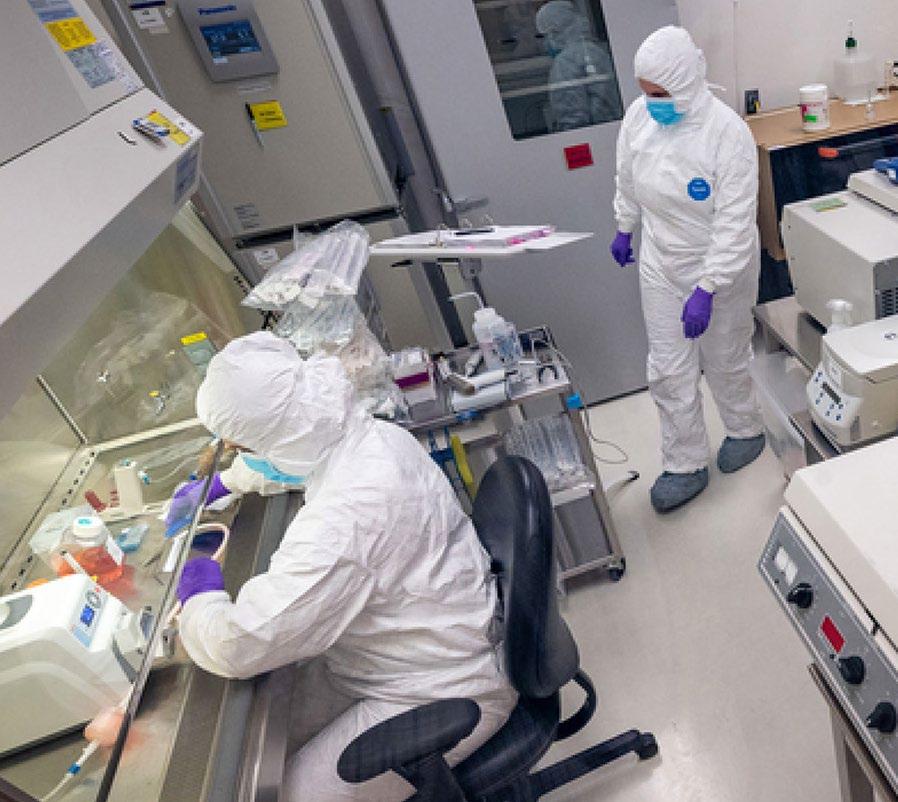
UC Davis sets a new record, surpasses $1 billion in research funding
The latest Blue Ridge Institute for Medical Research ranking placed UC Davis among the nation’s leading medical schools for National Institutes of Health (NIH) funding. It ranked the school 33 rd nationally, three spots above its previous ranking.

In 2021, the most recent data available, UC Davis School of Medicine achieved record-high NIH research funding with more than $194 million in grants, an increase of about $13 million over the previous year.
Eight departments ranked in the top 20 nationally in their respective fields. The UC Davis Departments of Cell Biology and Human Anatomy, Medical Microbiology and Immunology, and Emergency Medicine scored the highest funding in their respective fields among all University of California medical centers.
Top 20 for NIH funding:
Cell Biology and Human Anatomy, 7th Neurology, 7 th Public Health Sciences, 8 th Orthopaedic Surgery, 12 th Urologic Surgery, 12 th Psychiatry and Behavioral Sciences, 14th Dermatology, 14th Medical Microbiology and Immunology, 20 th
UC Davis School of Medicine has been granted full accreditation for eight years by the Liaison Committee on Medical Education (LCME), the accrediting authority for medical education programs leading to the M.D. degree in the U.S. The LCME team met with more than 150 faculty, staff, students and hospital leaders during the process.
“I want to thank everyone involved in our successful reaccreditation,” said
Susan Murin, the school’s interim dean.
“Our success is the result of years of meticulous preparations and extraordinary work by the Office of Medical Education and all who served on committees, assisted with preparations and participated in survey visits.”
The School of Medicine’s previous accreditation review took place in 2014, from which it also received a full eightyear accreditation.
UC Davis Health launched several new initiatives and partnerships this year that leverage technology to improve health care access and quality of care. Some examples:
We became the world’s first academic medical center to launch a Cloud Innovation Center with Amazon Web Services. Staff from both organizations will work with clinicians, students, partner organizations, and the community to define real-world challenges around digital health equity.
A new collaboration with BioIntelliSense aims to advance remote patient monitoring of vital signs across care settings, supporting the goal of delivering highacuity care at home that is grounded in equity. The effort involves FDA-cleared BioIntelliSense wearable technology with analytics.
A new National Center for Interventional Biophotonic Technologies will advance two optical imaging technologies developed at UC Davis — interventional fluorescence lifetime imaging, or iFLIM, and interferometric diffuse optical spectroscopy, or iDOS. The center will combine them with an AI-deep learning platform to provide real-time guidance of decision-making during medical and surgical procedures.
$1.7 million in new UC Davis Health federal funding will support the creation of a regional digital public health platform to improve access and continuity of care for vulnerable populations in Sacramento and Northern California.
“The new Avenue M program is critical for students who have the aptitude and desire to enter the medical fields yet may not have believed attainment was within their reach … Avenue M will help us better fulfill our commitment to serve students from all backgrounds as well as our region as a whole.”
UC Davis Provost Mary S. Croughan
“The students in our programs have faced many barriers in their pursuit of medicine. Too often this notion of a strong applicant to medical school is tied with privileged access to resources, which has historically excluded many from this path. Our group has worked collectively to shift this narrative by providing access to resources for students and reminding them that they do belong here. Most importantly, that our state’s communities need future doctors just like them here.”
“I’ve been fortunate to have had mentors who modeled the act of envisioning a future that might not yet exist. It’s my goal to do the same for others.”
Angelica Martin, Fourth-year UC Davis School of Medicine student
“Our program produces experts with a variety of backgrounds that can effectively communicate and collaborate with experts from other related disciplines in the increasingly complex realm of drug development.”
Donald
M. Bers, Professor and Chair of the UC Davis School of Medicine Department of Pharmacology“Health equity motivates much of my work. The long-term goal of this trial is to mitigate barriers that can get in the way of preventive health care for diverse patients.”
Susan D. Brown, Associate Professor of Internal Medicine
Cassidy
Kays, Coordinator for the UC Postbaccalaureate Consortium
Our generous donors powered more than $1.8 million in scholarships in fiscal year 2021–22 — a 20% increase over last year and nearly double what was awarded just six years ago!
We’ve raised $366.1 million — 86% of our $426.5 million goal with two years remaining in the Expect Greater campaign launched in October 2020.
Thanks to the support of our incredible donors, we raised $48.8 million in fiscal year 2021–22 for student scholarships and aid, research endowments, educational programs, and more.


UC Davis School of Medicine has launched numerous initiatives over the past 15 years to improve the health of California’s diverse population, especially in areas with a shortage of doctors.
Our Community Health Scholars pathways include:
ACE-PC, a three-year accelerated medical school track for primary care
REACH, which connects students to clinical care in the Central Valley
TEACH-MS, for students who want to practice in urban underserved settings
RURAL-PRIME, which provides training in rural areas
COMPADRE, a collaborative that places students and residents in rural communities between Sacramento and Portland
Tribal Health PRIME, for students dedicated to caring for Native American and Alaska Native communities.
In addition, the medical school was among the first in the nation to adopt holistic admissions practices which prioritize multiple factors beyond a student’s test scores, including their journey getting to and through college.
“UC Davis School of Medicine is a nationally recognized leader in training the next generation of diverse physicians who will help solve California’s health challenges,” said Susan Murin, interim dean of the School of Medicine.
“The Avenue M collaborative is an exciting new way we are partnering to advance health equity and significantly improve the health of diverse communities statewide.”
Avenue M supports students in community college and participating fouryear universities, then steers them toward the UC Davis School of Medicine.
UC Davis received a $1.8 million grant to create a robust pre-med pathway for rural college students. It’s the university’s latest initiative to boost the number of primary care physicians in underserved parts of Northern California.
The new pathway, known as Avenue M (the M is for Medicine) will identify community college students interested in studying health sciences. Staff will provide academic support, ensure students’ seamless transfer to any of three participating four-year colleges, then steer them toward the UC Davis School of Medicine.
Medical students who have deep ties to rural areas are more likely to want to practice primary care medicine there.
Avenue M is the newest pathway developed by UC Davis in response to the shortage of primary care physicians in rural, medically underserved areas of California.
“The new Avenue M program is critical for students who have the aptitude and desire to enter the medical fields yet may not have believed attainment was within their reach,” said UC Davis Provost Mary S. Croughan. “Like its predecessors Avenue E and Avenue B, which focus on engineering and biological science respectively, Avenue M will help us better fulfill our commitment to serve students from all backgrounds as well as our region as a whole.”
The three-year grant was awarded through state legislation to the Foundation for California Community Colleges under its California Medicine effort, a coalition of educational leaders, medical providers, elected officials and others committed to producing a diverse physician workforce to advance health equity.
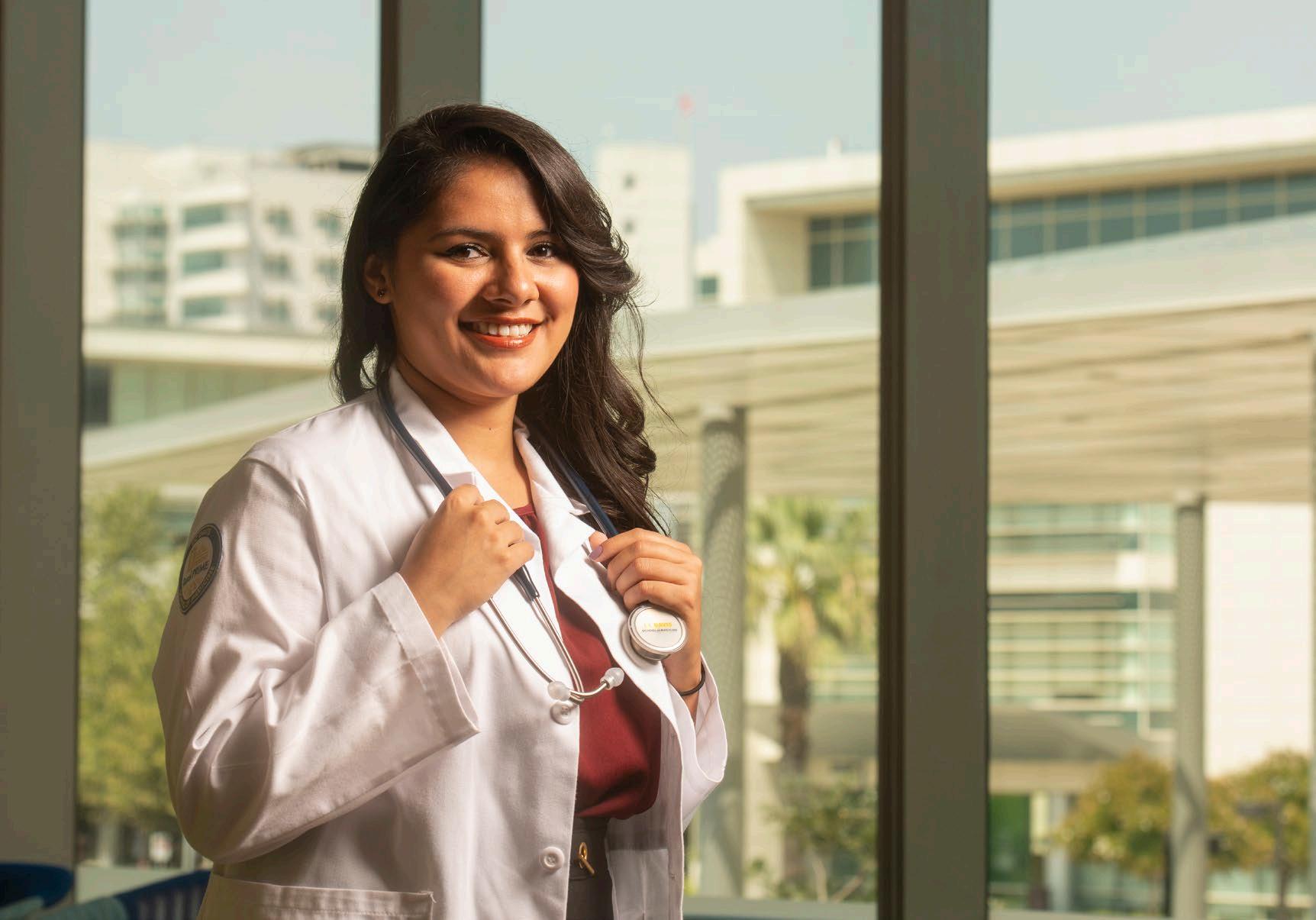
The foundation extended the award to UC Davis and three other institutions that will work with partner community colleges to establish Hubs of Healthcare Opportunity: UC Riverside, UCSF-Fresno and UC San Diego.
Avenue M is part of a collaboration with the School of Medicine, the UC Davis STEM Strategies group, Sacramento State University, Cal Poly Humboldt and Kaiser Permanente Northern California. It also includes other medical and health organizations creating an ecosystem of more than 20 community colleges in 14 California counties that feed into the universities.
Seven School of Medicine students participated in a monthlong clinical rotation in Roatan, Honduras, providing care and health education to the area’s medically underserved population. The trip was part of a global health elective that resumed after a pandemic pause.
The students worked under the supervision of local doctors and medical personnel to help people with limited care access in the island’s remote areas, some of which lack running water.
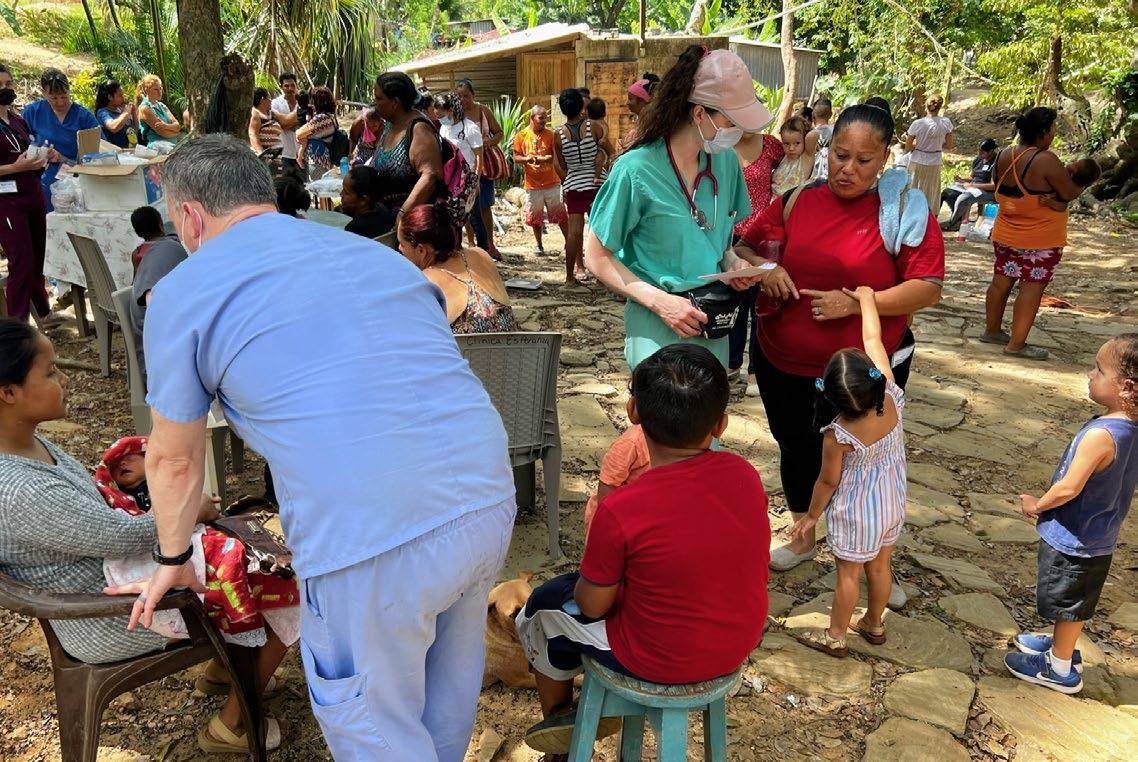
A cardiothoracic surgery resident who aspires to improve the technology behind vascular grafts and stents, as well as cell-based therapies for heart failure, has been awarded a prestigious postdoctoral fellowship.
The School of Medicine is well known for training students to make a difference globally by offering them experiences worldwide.
Nataliya Bahatyrevich received a federal NIH T32 award, which provides funding to incorporate a year of research into her residency. She’ll also use the year to pursue a biomedical engineering master’s at UC Davis.
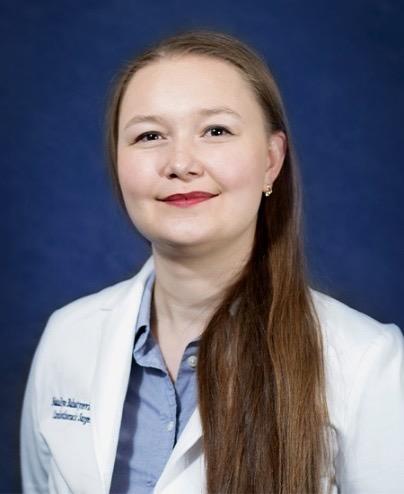
One of her current projects in Professor of Surgery and Biomedical Engineering Aijun Wang’s lab includes finding a way to successfully repair damaged inner lining of any blood vessel or promote inner lining of synthetic stents to look like healthy native vessels.
A breakthrough “would significantly impact patients with heart disease, end stage kidney disease, and peripheral vascular disease because many have limited surgical or medical therapy options,” Bahatyrevich said.
She’s also collaborating with Department of Surgery Distinguished Professor and Chair Diana Farmer, also a surgical bioengineering expert, to apply stem cell technology to heart failure patients.
Jade Tso’s passion for scientific research and global health started when she was 15. She interned with the American Chemical Society, which connected her to a notable chemist at UC Davis: Betty Burri of the federal government’s Western Human Nutrition Research Center.
Tso worked under Burri on a project related to vitamin A deficiency, a condition common in other countries. “This experience broadened my view of what science and research could look like,” Tso said.

Tso is now a first-year UC Davis medical student in the ARC-MD honors pathway, short for Academic Research Careers for Medical Doctors. And she’s on track to accomplish great things: Tso was recently named a 2021–2023 Anne C. Carter Global Health Fellow by the American Medical Women’s Association (AMWA), one of only four selected across the U.S.
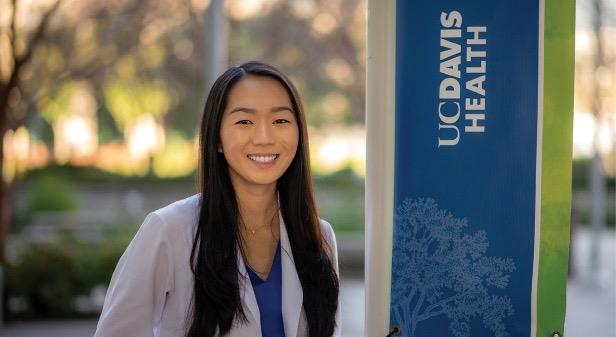
Fourth-year medical student Carter White, who co-leads Second Breath at the UC Davis School of Medicine, won an Emerging Physician Leader Award from Health Care Without Harm Physician Network. The group seeks to transform care worldwide and reduce its environmental footprint.
White was also named as an inaugural fellow of the new Blair and Georgia Sadler Fellowship, which includes a $1,000 award. White plans to use the prize to expand the student-run program. Second Breath saves unused and discarded medical equipment from going to the landfill, and provides it to individuals and organizations locally and around the world, including Africa and Ukraine.
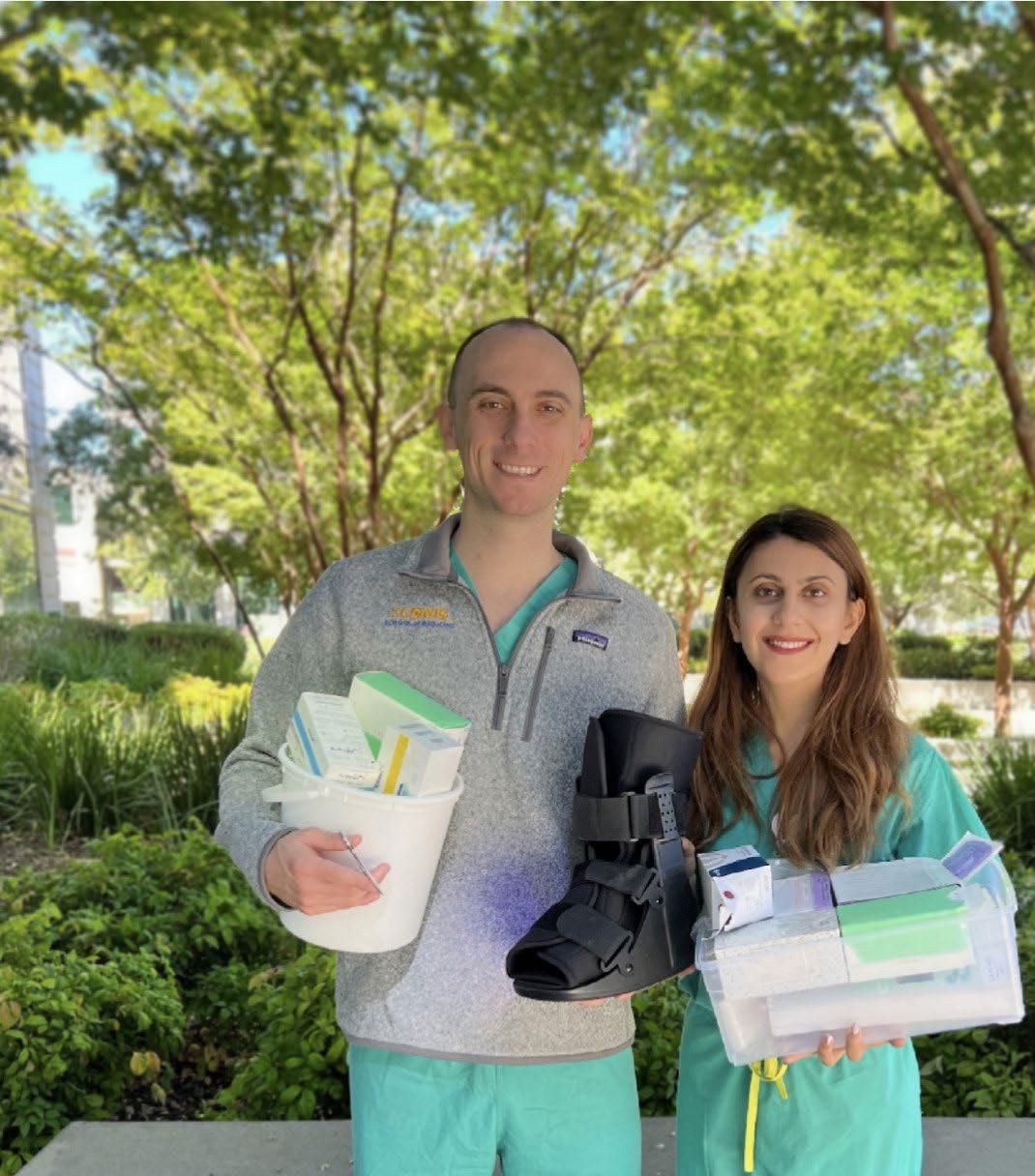
The UC Postbaccalaureate Consortium has received renewed funding to continue assisting students from educationally and economically disadvantaged backgrounds in gaining admission to medical school.
The three-year award of $500,000 comes from The California Wellness Foundation. It will help underrepresented students interested in the medical field prepare for the Medical College Admissions Test (MCAT) and provide enrollment in upper division science courses during the academic year either at a UC campus or UC Extension. Students will also receive guidance throughout the medical school application process.
“We are so proud of our entire UC Postbaccalaureate Consortium team, who put every effort into writing this grant and leading the communication with the funders,” said Charlene K. Green, assistant dean of admissions for the School of Medicine and grant co-principal investigator. “This funding renewal recognizes the value of this program and the importance of supporting underrepresented students, who are committed to practicing in underserved communities of California.”
Formed as a partnership of postbaccalaureate premedical programs at the Schools of Medicine at UC Davis, UC Irvine, UC Los Angeles, and UC San Francisco, the UC Postbaccalaureate Consortium’s mission is to increase
the number of physicians practicing in underserved regions of California. They do this by assisting capable and dedicated students from disadvantaged backgrounds in gaining admission to medical school.
Since its inception in 1991, the consortium has worked with over 1,400 students. Across all programs, over 90% of participating students have successfully been offered admission to medical schools across the U.S. within the past decade.

All 126 graduating students matched into 20 specialties A record-high 66% of graduates matched into primary care residencies
Graduates matched in programs across 18 states, yet 76% will stay in California
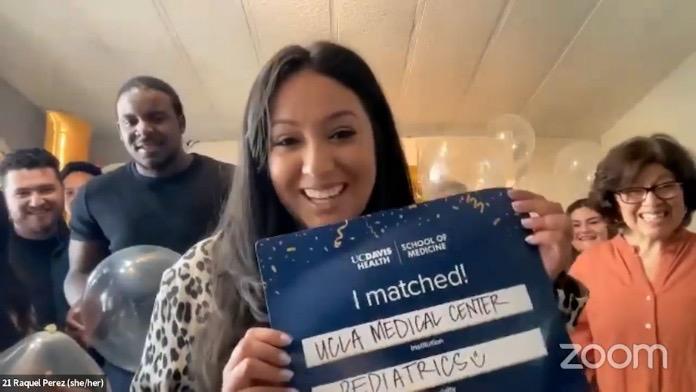
UC Davis Health designated as California’s first Thoracic Surgery Foundation cardiac surgical robotics training center
UC Davis Health has been designated as the first training center in California for the American Association for Thoracic Surgery Foundation’s Cardiac Surgical Robotics Program. Surgeons nationwide will come to UC Davis to learn leading-edge surgical techniques and master the fundamentals of robotic mitral valve surgery.
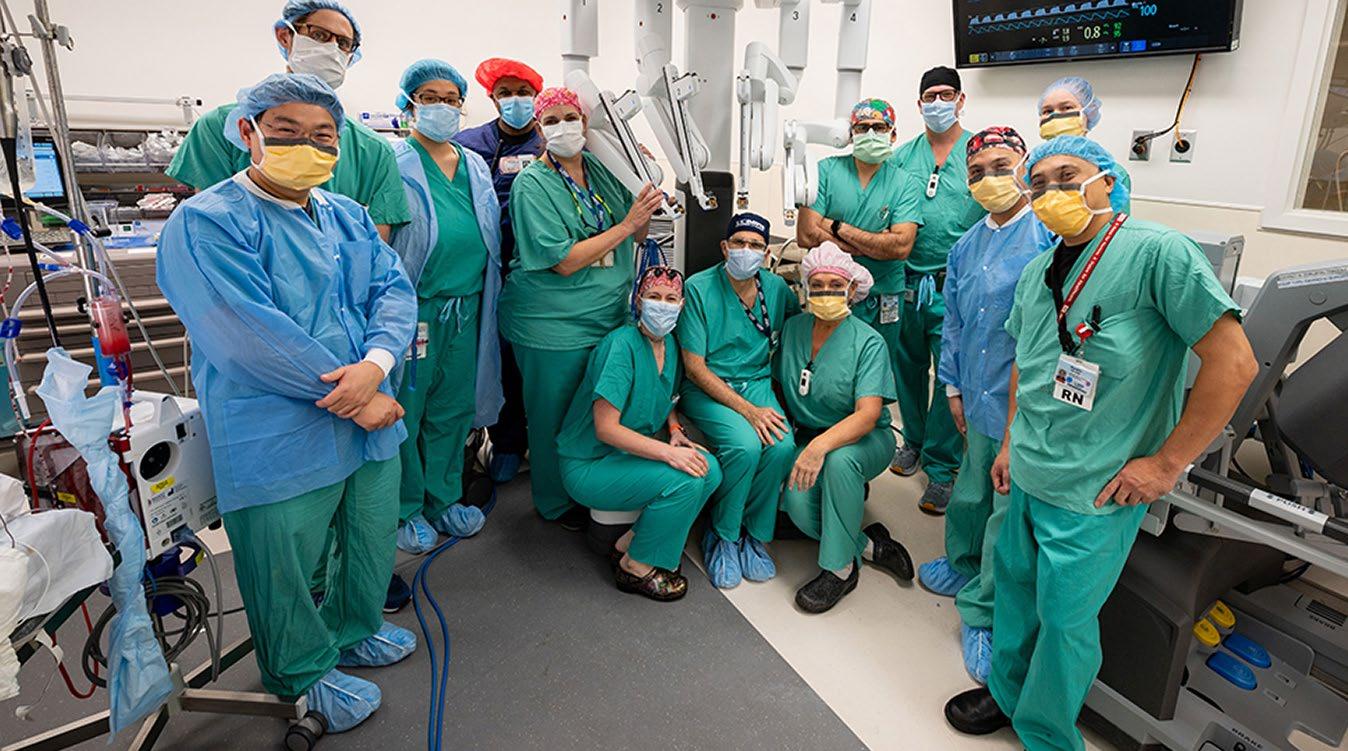
From left: Kent Leach, Lawrence J. Ellison Endowed Professor of Musculoskeletal Research and vice chair of research for orthopaedic surgery; R. Lor Randall, the David Linn Endowed Chair for Orthopaedic Surgery; David Lubarsky, CEO of UC Davis Health; Interim School of Medicine Dean Susan Murin; and Kim E. Barrett, the School of Medicine’s vice dean for research.
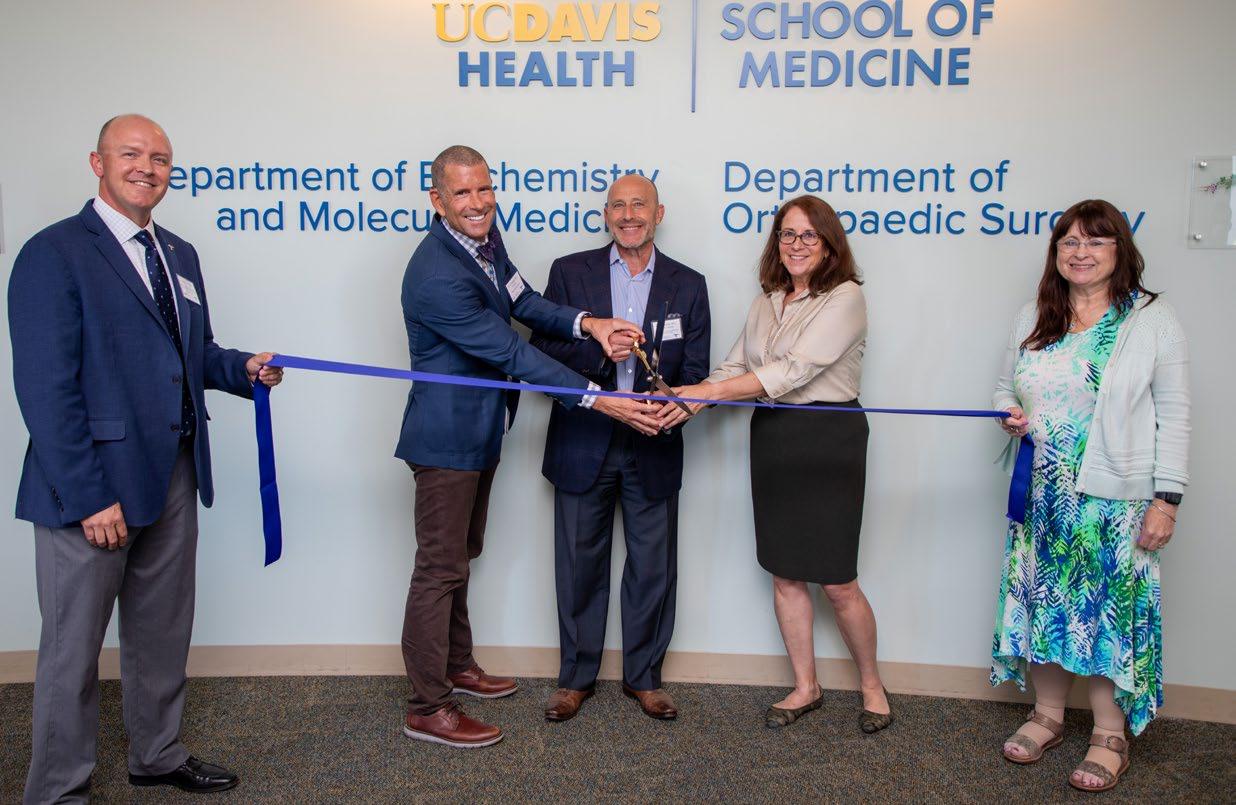
The UC Davis Lawrence J. Ellison Musculoskeletal Research Center opened a new center in June. The new location provides 9,000 square feet of laboratory space dedicated to advancing interdisciplinary research in musculoskeletal tissue and cellular biomechanics regeneration and repair. With the larger space, the center continues to foster innovative partnerships and opens new research avenues to faculty, students, residents and fellows.
The Departments of Orthopaedic Surgery and Biomedical Engineering received the prestigious NIH T32 training program grant for their project entitled MUsculoSkeletal Clinical Learning Experience (MUSCLE). The program will be based out of the Musculoskeletal Research Center and provide students with a broad experience in laboratory research focused on musculoskeletal health.
UC Davis School of Medicine creates Office of Wellness Education with $5 million gift
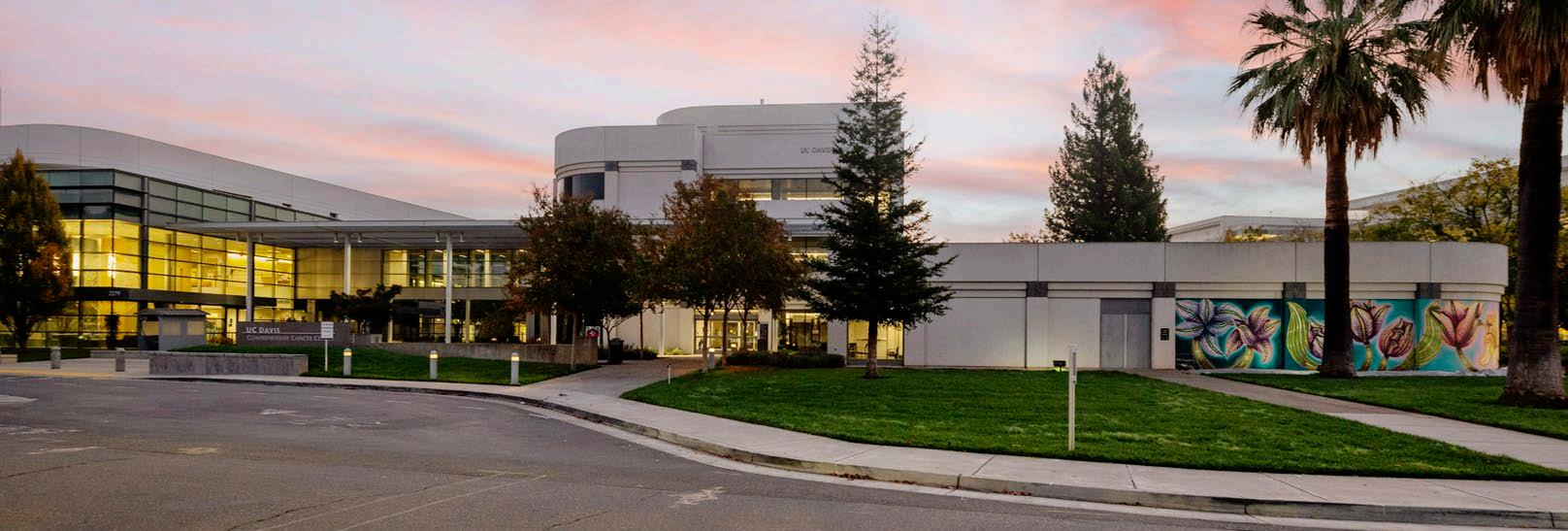
The UC Davis School of Medicine is making a unique commitment to the well-being of patients by establishing the Office of Wellness Education. The new office opened July 1 and is part of a first-of-its-kind initiative funded by a $5 million gift from Sacramento businessman Jim Anderson.
The Office of Wellness Education offers resources to the UC Davis Health community and the Sacramento region to help prevent illness and help people lead longer, healthier lives. Additionally, the gift will establish the Jacquelyn S. Anderson Endowed Chair in Wellness, which is slated to be held by Scott Fishman, professor of anesthesiology and pain medicine and director of the Center for Advancing Pain Relief.
New clinical trial focuses on improving care among diverse patients with gestational diabetes
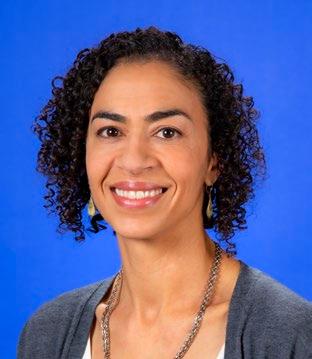
Susan D. Brown, associate professor of Internal Medicine, recently presented on the SUNRISE trial at a forum hosted by the UC Davis Center for Healthcare Policy and Research and the Perinatal Origins of Disparities (POD) Center. Funded by the National Institute of Diabetes and Digestive and Kidney Diseases, the trial aims to identify effective interventions that increase preventive screening for type 2 diabetes after a gestational diabetes diagnosis.
“Gestational diabetes is a common condition that disproportionately
affects people of color. It also increases chronic disease risk, which includes type 2 diabetes and cardiovascular disease,” Brown explained. “Health equity motivates much of my work. The long-term goal of this trial is to mitigate barriers that can get in the way of preventive health care for diverse patients.”
Every year, nearly 10 percent of pregnancies in the U.S. are affected by gestational diabetes. Patients diagnosed with the condition are over eight times more likely to develop type 2 diabetes after giving birth. They also have over two times higher risk of cardiovascular events within 10 years postpartum.
UC Davis receives $12.9 million grant aimed at improving health through precision nutrition
Five-year ‘All of Us’ study could accelerate breakthroughs to prevent and treat diseases
The UC Davis All of Us Research Program has been awarded a five-year, $12.9 million grant from the NIH to study the potential of customized diet recommendations to promote health and prevent disease, known as precision nutrition.
UC Davis is one of fourteen institutions to receive funding for the Nutrition for Precision Health study.
“Recommendations for optimal nutrition tend to focus on ‘one-sizefits-all,’ but in the future, we will see more emphasis on personalized public health,” said Sean Adams, a professor

in the Department of Surgery. Adams is the scientific director for the UC Davis Center for Alimentary and Metabolic Science and is part of the project’s principal investigator team.
The project is funded by the NIH Nutrition for Precision Health (NPH) initiative and involves investigators from the UC Davis School of Medicine, College of Agricultural and Environmental Sciences, USDA Agricultural Research Service on the UC Davis campus, UCLA Center for Human Nutrition, and the Cedars-Sinai Community and Population Health Research Center.
California Department of Public Health awards UC Davis $15.7 million to
The California Department of Public Health has awarded UC Davis Health a $15.7 million grant to help run the California Cancer Registry, a program that collects information about all cancers diagnosed in California. This three-year grant is the second renewal for UC Davis to manage the registry.
State law requires all invasive cancers diagnosed in California to be reported to the California Cancer Registry. The registry collects and analyzes cancer data and performs quality control.
A team overseen by Professors Theresa Keegan and Ted Wun provides statewide surveillance and IT functions. The team also collaborates with three regional registries funded by grants from the state and the National Cancer Institute and provides support for the national, regional and state Cancer Center Registry initiatives.
NIH grant creates national center at UC Davis
Light-based, AI technologies could transform interventional health care A new center that seeks to transform surgical procedures and brain monitoring using light-based, artificial intelligence-informed technologies will soon be part of Aggie Square at the University of California, Davis, thanks to a recent $6.3 million P41 grant from NIH’s National Institute of Biomedical Imaging and Bioengineering.
The National Center for Interventional Biophotonic Technologies (NCIBT) will advance two optical imaging technologies developed at UC Davis — interventional fluorescence lifetime imaging, or iFLIM, and interferometric diffuse optical spectroscopy, or iDOS — and combine them with an AI-deep learning platform to provide real-time guidance of decision-making during medical and surgical procedures.
The center will support research and development, clinical application, and training and education of the new technologies and promote their adoption to improve the quality of interventional health care.
The grant will also support the establishment of a physical center at UC Davis’ Aggie Square. This will include stateof-the-art laboratories, teaching space, learning centers and the organizational headquarters of the center’s training and education programs.
Laura Marcu is the founding director of NCIBT and a professor in the UC Davis College of Engineering’s Department of Biomedical Engineering. Griff Harsh, professor of neurological surgery, is the deputy director and training leader of NCIBT.
Clinical trial aims to restore speech with brain-computer interface
BrainGate2 will use brain implants and machine learning to ‘decode’ intended speech of people who can’t speak UC Davis Health is recruiting people for a clinical trial with the goal of building a “neurological prosthesis” for restoring speech to people who have lost — or are losing — the ability to speak. The research is aimed at people who have neurological injuries or progressive neurological diseases, such as spinal cord injury, stroke and amyotrophic lateral sclerosis (ALS).
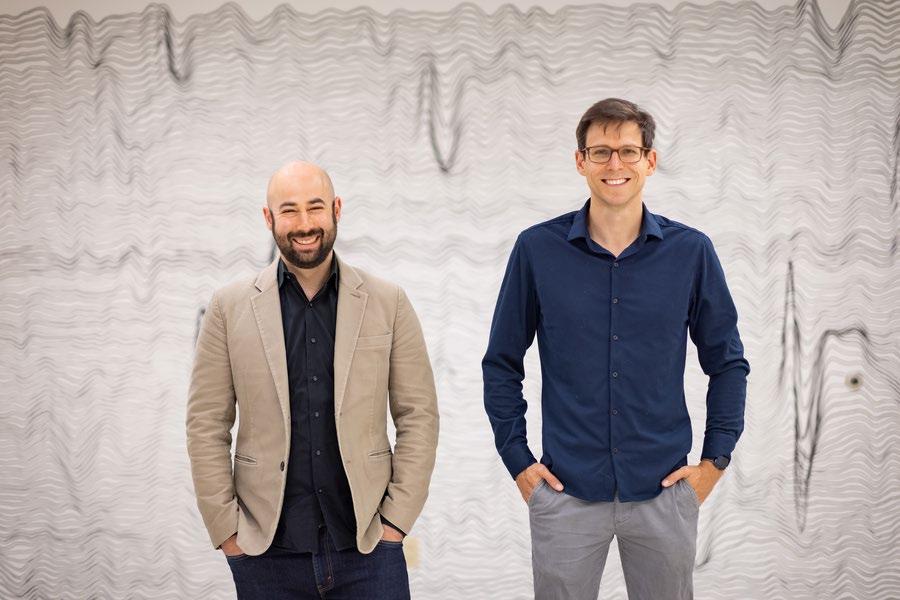
With this study, UC Davis joins BrainGate, an ambitious consortium of universities and academic medical centers studying how brain-computer interfaces can be used to restore neurological function in people living with paralysis. The technology is also sometimes referred to as brain-machine interfaces or neuroprostheses.
David Brandman is an assistant professor in the Department of Neurological Surgery and the site-responsible investigator for the study. He is also the co-director of the UC Davis Neuroprosthetics Lab and will lead the surgeries for the study.
Sergey Stavisky, a neuroscientist and neuroengineer, is an assistant professor in the Department of Neurological Surgery. He is the scientific lead for the study and the co-director with Brandman of the UC Davis Neuroprosthetics Lab.

The School of Medicine has received a renewal of the prestigious NIH T32 training program grant. The award will help fund the Pharmacology Training Program, which educates the next generation of biomedical researchers in the concepts of drug discovery and development, inclusive of a clinical perspective.
This renewal marks the third time the Pharmacology Training Program has received the T32 Training Grant, which has supported over 54 graduate students in the last 10 years.
Spearheaded by Johannes W. Hell and Donald M. Bers of the Department of Pharmacology, the program includes diverse faculty members from 14 departments in six UC Davis colleges, where extensive collaboration already exists.
Trainers provide in-depth expertise on a range of topics. These include identifying novel therapeutic molecular targets and the development of therapeutic molecules, as well as clinical drug and stem cell trials at the NIH-funded UC Davis Clinical and Translational Science Center and NCI-designated UC Davis Comprehensive Cancer Center.

Kim E. Barrett , vice dean for research for UC Davis School of Medicine and distinguished professor of Physiology and Membrane Biology, has been selected as one of six honorary fellows for the Physiological Society. The Physiological Society is the largest network of physiologists in Europe, with academic journals of global reach.
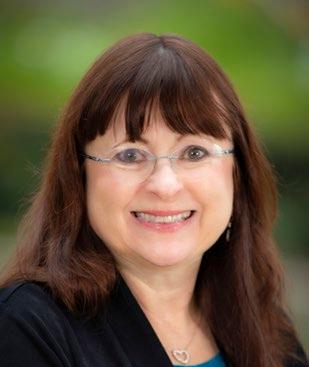
Sergio Aguilar-Gaxiola, professor of Clinical Internal Medicine and founding director of the UC Davis Center for Reducing Health Disparities, has been appointed to the National Center for Advancing Translational Sciences Advisory Council. He also directs the Community Engagement Program of the UC Davis Clinical Translational Science Center. Aguilar-Gaxiola’s applied research program has focused on identifying unmet health needs, associated risks and protective factors to better meet the needs of underserved populations and advance equity. He has also led nationally recognized community-based approaches to develop, implement, evaluate and share best practices on community engagement with underserved communities and enhance interagency collaboration to transform care systems and further health equity.
Amy R. Brooks-Kayal, professor and chair of the Department of Neurology, is the inaugural holder of the Andrew John Gabor, M.D., Ph.D. Presidential Chair. Brooks-Kayal is an internationally recognized epileptologist and a leader in research on novel therapies for epilepsy. The endowed chair will support research of breakthrough treatments in epilepsy and other seizurerelated disorders.
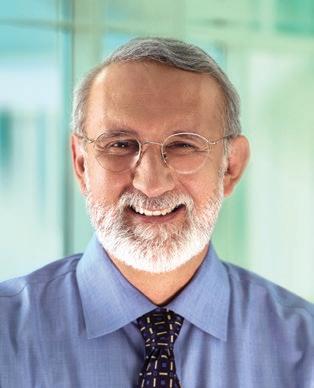

Xiao-Jing Wang has joined the UC Davis Comprehensive Cancer Center as chief science officer. She is also the center’s associate director for basic science, a role previously held by Luis CarvajalCarmona who was appointed the cancer center’s chief diversity officer and director of the new Center for Advancing Cancer Health Equity.
Wang has also been appointed as the Robert E. Stowell Endowed Chair in Experimental Pathology in the UC Davis School of Medicine’s Department of Pathology and Laboratory Medicine. Wang comes to UC Davis from the University of Colorado Anschutz Medical Campus, where she had joint appointments in the departments of pathology, dermatology, otolaryngology, radiation oncology and craniofacial biology.
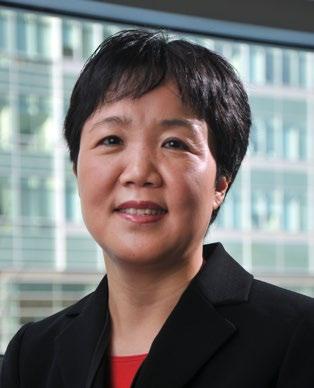
UC Davis Comprehensive Cancer Center’s Laura Fejerman, associate professor in the Division of Epidemiology and director of the Women’s Cancer Research and Care Program (WeCare), met First Lady Jill Biden in February during a Cancer Moonshot 2022 event at the Mays Cancer Center in Texas, and was one of three scientists who presented on cancer health disparities research. Fejerman, who also co-directs the cancer center’s Latinos United for Cancer Health Advancement (LUCHA) initiative, presented findings regarding cancer risk assessment in Latinas, including two factors contributing to disparities: lack of access to high-quality care, and limited data availability for improving risk prediction in diverse populations.
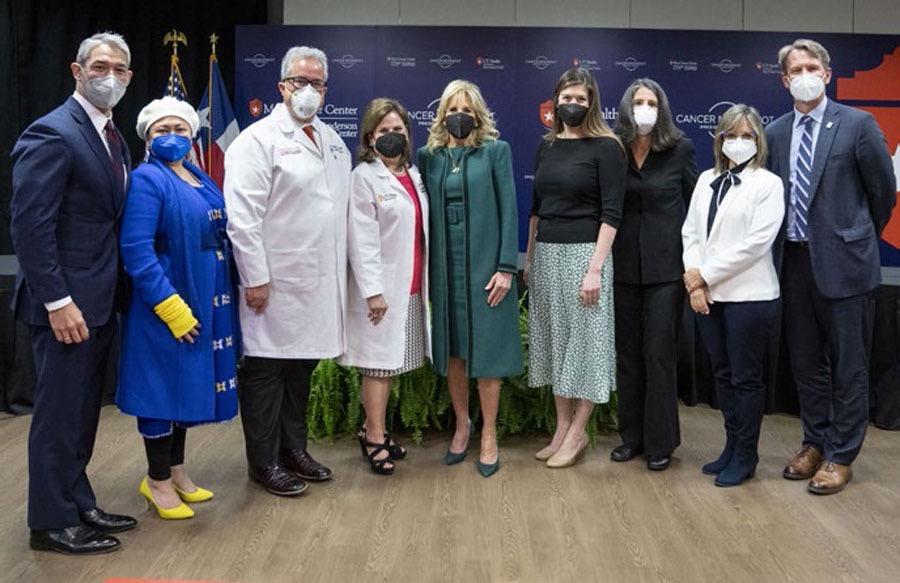

Kent Lloyd, associate director of the UC Davis Comprehensive Cancer Center, director of the UC Davis Mouse Biology Program and Department of Surgery professor, has been appointed a member of the National Institutes of Health Council of Councils. Appointees provide professional and expert advice to NIH leaders on numerous areas of activities and policies in the Director’s Office. The council is made up of 27 members, selected from the advisory councils of NIH institutes and centers, representatives nominated by Office of the Director program offices, and lay representation. This will be Lloyd’s second time serving as a member; his prior appointment spanned from 2011 to 2014.
Developmental psychologist Sally J. , who co-developed a leading form of behavioral therapy for autism, has received the Lifetime Achievement Award from the International Society for Autism Research (INSAR). Rogers, a UC Davis MIND Institute faculty member and psychologist, is a professor emeritus in the Department of Psychiatry and Behavioral Sciences. The INSAR award acknowledges “significant fundamental contributions to research” with lasting impact on the field. Rogers and Geraldine Dawson created the Early Start Denver Model (ESDM), an intervention designed for infants, toddlers and young children with autistic characteristics. ESDM manuals have been translated into more than 16 languages and are used by clinicians around the world. The MIND Institute offers training and certification classes in the approach.
UC Davis Health Department of Surgery Distinguished Professor and Chair Diana Farmer is one of 11 recipients of the 2022 Harrington Scholar-Innovator Awards, given by the Harrington Discovery Institute at University Hospitals of Cleveland. The awards support a diverse set of drug discovery projects and include grants of at least $100,000, with the opportunity to qualify for up to $1.1 million. Farmer’s spina bifida research has produced a unique “patch” engineered from placental mesenchymal stem cells, applied to a baby’s exposed spinal cord during an in-utero surgery. In 2021, Farmer launched the first-in-human clinical trial to test the procedure and patch for treatment of spina bifida. Farmer’s award will support further development of this technology for adult acquired spinal cord injury.


Su-Ting Li, vice chair of education and residency program director in the UC Davis Department of Pediatrics, has received the Robert S. Holm, M.D. Leadership Award from the Association of Pediatric Program Directors (APPD). Li helped develop, implement, and chair the APPD’s Leadership in Educational Academic Development Council, a nationally recognized program for pediatric medical education leaders who learn from seasoned program directors, pediatric educators, and other national pediatrics leaders.

